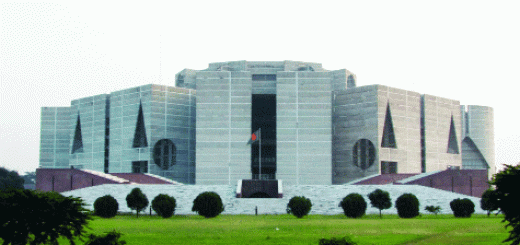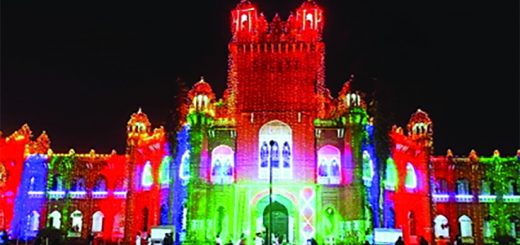Criminalising Campuses
F M M Hossain
In a Dhaka-bound train, crammed to the roof with people, an aged man, sitting beside me, started his story, sombre expression on his face: ‘In childhood days, I was inquisitive so much so that I would dare doing anything prohibited for the boys of my age. That was the time when going to a movie theatre was considered a sin or at least violation of social values.
One evening I did that, defying possible cruellest treatment from the elderly people. At home, my confession was greeted with howls of derision. At school, I was caned and, on my back, two perilous canes left deep scars and for the depth of the scars they made, the canes worked so hard that, at the end, they lost capacity for reuse for ever.
But I kept track of the user of the canes. Two weeks later, I saw him coming out of the same movie theatre. He faced a challenge. `You saw this cinema, Sir?’
Instantly he slapped me hard.’
Does this story represent the morals and manners of the present-day teachers?
Over the decades, most of our public universities appear to bristle with problems. Allegations of corruptions, nepotism and political loyalty have been brought against most university authorities. Teachers and students rally against top administrators in universities and colleges. Recently they demanded resignation of vice-chancellors of four leading universities: BUET, DU, Jahangirnagar University and Rajshahi University. At least four tertiary-level educational institutions were closed in the wake of violent protests in the past months. Several other such institutions are in stalemates facing movements that spoiled educational atmosphere, hindering academic life of thousands. To understand the magnitude of the loss of the students, let’s say about the BUET where the academic activities remained suspended for the last five months. BUET is, everyone knows, one of the few institutions the nation can be proud of. However, as political parley remains in progress, it is already known that the government decided to remove the pro-vice chancellor of the institution and hopefully other problems would be addressed soon. This Saturday, the academic activities are supposed to resume in the BUET.
Who should be held responsible?
One recently-written article by Mohiuddin Alamgir reads: ‘Leading public universities of Bangladesh are running with non-elected and ruling party nominated vice-chancellors, registered graduate representatives to the senate and students unions thus defying rules and regulations of these universities. As the top bosses of the universities are not appointed as per rules and regulations, they are not appointed on the basis of academic, intellectual or management skills or merit but political ones, selected by the ruling parties…..as these individuals remain very much loyal to the government. As a result of this they blatantly behave like political activists and not as an educationalist.’
The university 1973 Ordinance says, ‘The Vice-Chancellor shall be appointed by the Chancellor for a period of four years from a panel of three persons to be nominated by the Senate on such terms and conditions as may be determined by the Chancellor, and shall be eligible for re-appointment for a further period of four years.’
In his article, Alamgir Mohiuddin says: ‘No VC panel election to the Chittagong University was held in 24 years, Rajshahi University in 12 years, Dhaka University in eight years……Instead the appointment has gone to persons selected by the ruling government during this long period. The Chittagong University has had eight persons as vice-chancellor by the selection of ruling government in last 20 years……No VC panel elections were held in Bangladesh University of Engineering and Technology (BUET), Shahjalal University of Science and Technology and Khulna University.’
Regarding other elections, things have gone from bad to worse. Elections of registered graduates’ and teachers’ representatives to senate of Chittagong University were not held in the last 26 and 11 years respectively. In Shahjalal University of Science and Technology, elections of registered graduates’ and teachers’ representatives to senate were not held in past 21 years. In Rajshahi University, registered graduates’ representatives’ election was not held in last 18 years and teachers’ representatives’ election was not held in last seven years. Seven years back, Khulna University held the senate elections. Fourteen years have passed since registered graduates’ representatives’ election was held in Jahangirnagar University. Dhaka University held registered graduates’ and teachers’ representatives’ election in 2009.
Different universities have witnessed no elections to students unions for more than two decades. As a result of this, students had to refrain from giving consents about running the universities. In other words, they have learned how to run a democratic institution in an autocratic way.
The result is obvious and harsh. The newspapers carry stories. Government-backed vice-chancellors often fail to safeguard the interest of teachers, students and staffers. Gradually anger among the deprived takes violent shape, which eventually interrupts normal educational atmosphere.
Another selected part from Alamgir’s article: ‘Violent activities in the public campuses were carried out mainly by the ruling Awami League-backed student organisation, which has become a synonym for dominance in the academic institutions, according to teachers and students.’
A few of the political incidents that paralysed educational institutions are as follows:
On August 7, this year, at least 25 students were injured, four of them shot with bullets, in series of clashes between two factions of the ruling-party backed student organisation on Islamic University campus. Murari Chand College in Sylhet has been closed since July 8 after its century-old hostel was burned to ashes by BCL activists. Teachers of Khulna University of Engineering and Technology went on strike in May, this year, in protest at a case filed against some teachers by the leaders of same organisation. Rajshahi University of Engineering and Technology was closed after the death of BCL leader Abdul Aziz Sajib in clashes between BCL factions. Chittagong University has been closed on February 8, this year after armed Chhatra League cadres killed two students – Masud-bin-Habib and Mujahidul Islam, activists of Islami Chhatra Shibir. The two had brilliant academic results. The student front of AL activists vandalised four rooms in Zia dormitory of Rangpur Medical College on April 30, this year. BCL clashed with Chhatra Dal on July 14, a day prior to the election of the students union at Pirojpur Government Suhrawardy College. As a result, the election was postponed and the campus shut for indefinite period.
Furthermore, as per a New Age report, published in January this year, at least 15 students or student activists were killed in Chhatra League’s factional clashes. Besides, 19 were killed in clashes between different student bodies since 2009 and for most of the casualties, Chhatra League was found responsible. The exasperated University Grants Commission said in a statement: ‘The prevailing situation will hamper the tertiary level education.’
This story never ends if we do not listen to what Dhaka University Vice Chancellor AAMS Arefin Siddiqui said after Pro-Vice Chancellor Harun Ur Rashid and Treasurer Mizanur Rahman resigned over ‘differences of opinion’ about running university.
The same group of people who are trying to create anarchy in the country are also conspiring to destabilise the campuses. When BNP was in power its student front Jatiyatabadi Chhatra Dal was no less good than their competitive organisations pushing the educational campuses back. These capitalist student politics have got the same nature as their patrons — AL and BNP — have. The successive governments have been engaged in disengaging their student front from study. Rather these student fronts are continuously being used as a pawn to go to power, criminalising the student politics forever.
The old man, looked at all passengers around him and broke his long silence. ‘Listen, sons and brothers, the campus incidents what we heard about so far with heavy hearts began on the day we followed secular education, shrugging off Islam from the campus. Reasonably, the similar incidents would recur if there is no correction. Fear Allah subahanata’ala, Remember, the Day of Judgement and Retribution. We can hope no body lies, deceives and harms other people.’
The train, meanwhile, reached the station, and the passengers began clambering down. And I lost him, the whistle-blower, among the jostling crowd, but for long my two ears resounded with his last words.











Recent Comments